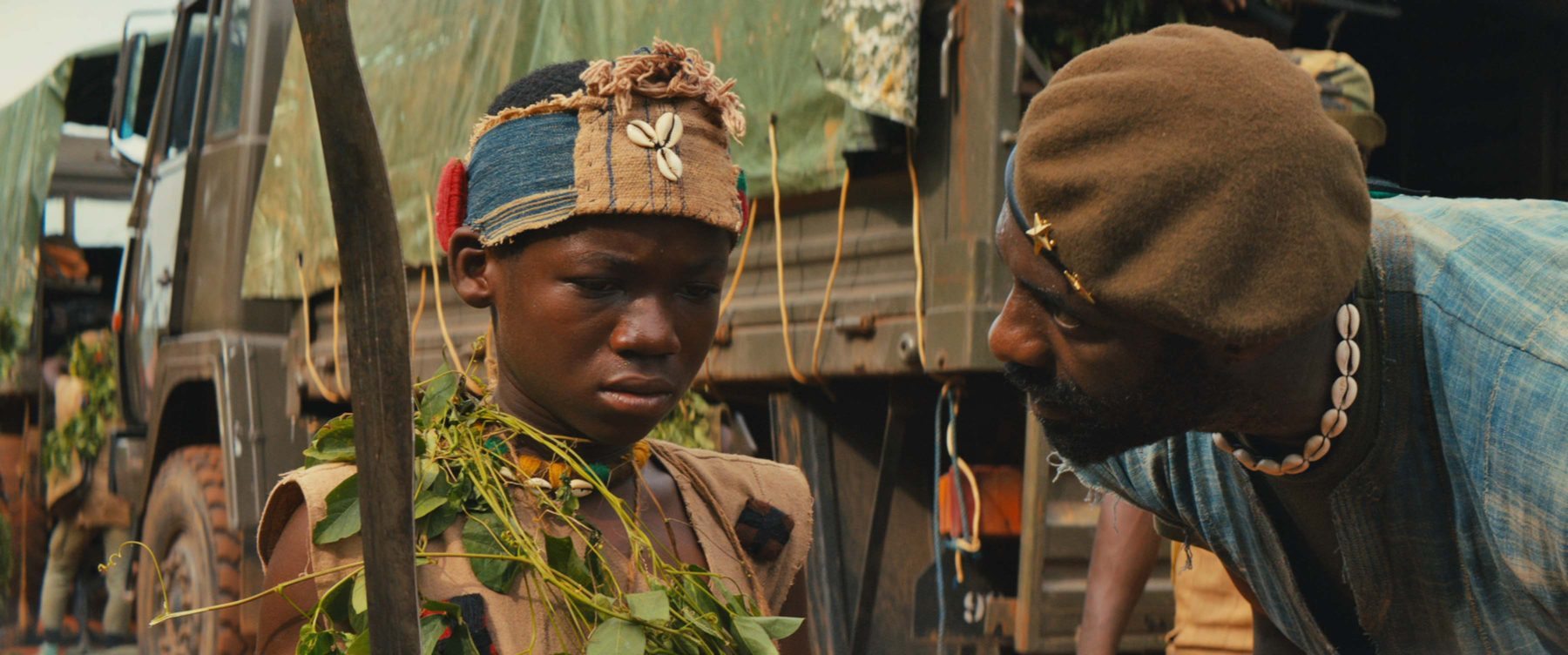Beasts of No Nation
Beasts of No Nation is one of those films that comes along and violently tries to shake us out of our mundane reality. Evoking everything from The Thin Red Line to Blood Meridian, but very much remaining its own beast, it reminds us that, yes, even now, there are parts of the world that are hellish, violent and unliveable, be you old or young, man or woman, a member of an army or a member of a rebellion. Or, if you’re a young boy like Agu (Abraham Attah), caught somewhere in between, with no place left to run but into the arms of the devil.
The film takes place in an unnamed African country and centres on Agu and his family, who live in a village on the UN buffer zone by a neighbouring state. He lives a happy, stable life with his family; his father provides land to the refugees from a nearby civil war, which has angered many members of his own community. (Does this sound familiar?) However, it’s not long before the village hears reports that the war is moving closer. Agu’s mother and sister get away but, after being captured by the army, Agu sees his father and brother brutally murdered, and he is left scared and alone in the vast African wilderness.
Beasts of No Nation marks the start of Oscar season in earnest. It is a tremendous success for Netflix – who, as expected, prove that it is the message that matters, not the medium – and it is one of the best films of the year.
Enter Idris Elba’s Commandant. He is swaggering, ruthless and, above all, charismatic, so much so that he has compelled a battalion of (very) young soldiers to fight for him. He finds Agu in the jungle and sees potential in him, and decides to induct him into the tribe. Agu has to learn how to fire a gun, take a beating, and participate in an unforgiving initiation ceremony, where the price of failure is having your throat slit.
The Commandant’s appeal is cultish – he has soldiers fire blanks at the boys to make them believe they invincible, and he even has them believe they are part of his “family”, saying to Agu: “I will always protect you because you are my son. And a son always protects a father.” Of course, this results in an almost unwatchable sequence where Agu is told to kill a man with a machete. “These are the dogs that killed your father,” he says, even as the man pleads he is only an engineer out to fix bridges. Inevitably, Agu and his friend Strika end up hacking the man to bits.
This is a very nasty and violent film: certainly not for the faint of heart. Yet I think it would be disingenuous to make it any other way. To truly understand a world where this can be allowed to happen, the film has to submerge the viewer in a world of blood, sweat, mud and more blood, and take the most sacred of cinematic icons – the innocent child – and crush it into dust, to devastating effect.
Cary Joji Fukunaga, the director, is a master of storytelling and atmosphere, as both Sin Nombre and True Detective proved. But this is arguably his best film. It takes a clear social message and imbues it with astonishing cinematic ability, such as an amazing sequence where Agu rubs hallucinogenic drugs into a wound that transforms his environment into a reddish alien environment, one where he no longer finds himself shocked by the violence around him.
Cary Joji Fukunaga, the director, is a master of storytelling and atmosphere, as both Sin Nombre and True Detective proved. But this is arguably his best film.
The performances are also superb. Elba is, as you’d expect, dominant as a villainous evil allowed to enact his savagery across the land; though there is the interesting dimension of him contending with distant government superiors, who are constantly yanking on his choke chain. He certainly deserves an Oscar nomination, if only for the sickeningly physical scene where he pumps up his soldiers for a fight. But the real revelation is Abraham Attah, a newcomer who is utterly convincing as a child who, as the film progresses, loses his childhood innocence and adopts a glazed and haunted expression. Beasts of No Nation marks the start of Oscar season in earnest. It is a tremendous success for Netflix – who, as expected, prove that it is the message that matters, not the medium – and it is one of the best films of the year.
Director: Cary Joji Fukunaga
Cast: Abraham Attah, Idris Elba, Ama K. Abebrese, Grace Nortey
Length: 137 minutes
Country: USA

Comments (1)